On July 29, Rihab Chaieb announced she was canceling her appearance at the Lanaudière Festival’s “Rossinimania” concert on July 31. With Omicron cases still high and cancellations being announced right and left, I was concerned for the fate of Chaieb’s August 2 Ottawa Chamberfest debut. Fortunately, the Tunisian-Canadian lyric mezzo was able to recover enough for her Ottawa performance to go ahead as planned.
Chaieb graduated from the Metropolitan Opera’s Lindemann Young Artist Development Program in 2019 after taking third prize the previous year at the Operalia competition. With her rich, spicy, Turkish-coffee timbre, fiery energy and smoldering gaze, it’s no surprise that roles like Carmen and Sesto have become the bread-and-butter of her burgeoning career. At Chamberfest, however, she showed off a different side of her versatile artistry, presenting a thoughtful program of concert works that capitalized on more subtle vocal qualities of shading and luminosity, and on her sensitive, expressive approach to text.
Chaieb’s painted Respighi’s Il Tramonto in lavish, romantic colours, muted with melancholy. She didn’t overuse declamatory effects, instead reveling in Respighi’s voluptuous, decadent phrasing and harmonies. Her excellent support allows for generous legato, and she deploys her considerable power judiciously to create thrilling moments of pathos and emotion.

Mezzo-soprano Rihab Chaieb at Ottawa Chamberfest, joined by violinists Aaron Schwebel and Emily Kruspe, violist Keith Hamm, and cellist Leana Rutt. Photo: Curtis Perry
Chaieb performed the string quartet version of Il Tramonto and her instrumental collaborators were equal to the task, with especially beautiful playing by cellist Leana Rutt. The high caliber of string playing continued with a lush, ardent reading of Schoenberg’s string sextet Transfigured Night, with violinists Aaron Schwebel and Emily Kruspe, violist Keith Hamm, and cellist Rachel Mercer joining Rutt. Chamberfest artistic director Carissa Klopoushak, who principally plays violin, was in the second viola chair.
Celebrating her roots, Chaieb sang Lamma bada Yatathanna, one of the Arabic world’s oldest and most beloved songs, recorded by everyone from Lebanese pop icon Fairouz to contemporary Algerian rock artist Souad Massi. Chaieb performed the voice and piano arrangement commissioned for her as part of the Lindemann Program by American composer Rosalie Burrell.

Mezzo-soprano Rihab Chaieb at Ottawa Chamberfest, joined by Hinrich Alpers on piano. Photo: Curtis Perry
It was interesting to compare Chaieb with soprano Miriam Khalil, who performs a more traditional arrangement of this work. Khalil, who is Lebanese-Canadian and grew up listening to music like this, really leans into idiomatic, non-Western styles of ornamentation and interpretation; she favours a swaying, dancing tempo. Burrell’s arrangement is slower, statelier, and makes heavy use of Andalusian, Albéniz and Ravel-influenced flourishes in the piano (played with panache and dazzling tone by Hinrich Alpers). As a result, Chaieb’s approach is more formal, her use of portamento and turns less extravagant, but always compelling. Khalil’s version of this sensual song is teasing and playful, Chaieb’s more languorous and lovesick. It’s surely a sign of progress on the programming diversity front when a critic has the luxury of comparing two brilliant Canadian classical singers in the same Arabic-language piece.
Fittingly, Chaieb closed the steamy summer evening with Berlioz’s Les Nuits d’été, in an arrangement for string sextet by British composer David Matthews. With its shifting moods portraying the kaleidoscope of romantic love, from the joy of a springtime flirtation, to longing after the distant beloved, through to the humorous conflict between naïveté and cynical experience, the work fits Chaieb’s artistry like a shimmering silk robe. After the straightforward, sunny buoyancy of ‘Villanelle’, her ‘Spectre de la Rose’ was brimming with tender ecstasy. Absence simmered with yearning and desire behind its elegant presentation. Chaieb used her inky lower register to marvelous, despairing effect in ‘Sur les lagunes’. Only ‘Au cimetière’ somewhat missed the mark; she could have weaved a ghostlier, more Gothic sheen into her palette. However, concluded the set with a properly swashbuckling, winking ‘L’Île inconnue’, ending the demanding program showing no trace of vocal fatigue or strain from her prior illness.

Mezzo-soprano Rihab Chaieb at Ottawa Chamberfest. Photo: Curtis Perry













